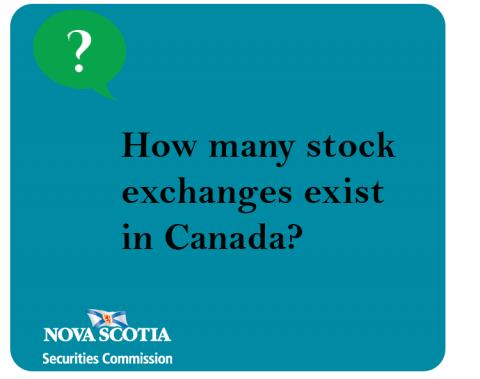Submitted by nsscadmin on

If you think the only stock exchange in Canada is the Toronto Stock Exchange, you’re missing more than a few. Currently there are eight stock exchanges registered in Canada and each is just a little different.
We’ll start with the most well-known exchange in Canada, the aforementioned Toronto Stock Exchange (TSX). Launched back in 1861 the TSX is currently the ninth largest stock exchange in the world with the companies and equities listed valued over $3 trillion. The largest and most widely held companies in the country are listed on the TSX and come from various economic sectors including finance, energy, technology, real estate, mining, oil and gas and retail. The TSX isn’t limited to trading shares. ETFs, income trusts and closed-end funds and structured notes are also listed on the exchange.
After the TSX the most well-known exchange in Canada is the TSX Venture Exchange (TSXV). It was founded in 1999 following a restructuring of Canadian markets that saw the merger of the Vancouver Stock Exchange and the Alberta Stock Exchange. The TSX Venture Exchange was formerly known as the Canadian Venture Exchange and is a public venture capital marketplace for emerging companies that are not large enough to be listed on the TSX.
One of the newer exchanges in Canada is the Canadian Securities Exchange (CSE). Formerly known as the Canadian National Stock Exchange, the CSE was founded in 2001 as an alternative stock exchange. It dubs itself as “the exchange for entrepreneurs” and is a modern and efficient alternative for companies looking to access Canada’s public capital markets. Substantially smaller than the TSX and TSXV, the CSE lists over 200 equities, government bonds and other structured products. Many issuers listed on the CSE are in the mining and cannabis businesses.
The Montreal Exchange (MX), also known as the Bourse de Montreal, is Canada’s oldest exchange and is the exchange for equity and index related derivatives and future contracts for interest rates and currency options on the US dollar. As the primary derivatives exchange in Canada, it offers a means for investors to speculate and hedge various asset classes.
If you’ve ever watched an NFL game on an American network you’ve likely seen a commercial for NASDAQ. There’s also a Canadian equivalent to the NASDAQ, called the Nasdaq CXC Exchange (formerly NASDAQ Canada). Nasdaq CXC is a subsidiary of the American NASDAQ Stock Market Inc. and provides an alternative platform for block share trades. Unlike most other exchanges, Nasdaq CXC does not list its own companies, but trades the securities of companies listed on the TSX, TSXV and CSE.
The most recent addition to the Canadian stock exchange list is the Neo Exchange (formerly the Aequitas Neo Exchange). The Neo Exchange launched in March, 2015 and was recognized by the Ontario Securities Commission later that year. NEO is home to over 125 unique public listings, including public companies, ETFs, Special Purpose Acquisition Companies (SPACs), Growth Acquisition Corporations (G-Corps), and Closed-End Funds (CEFs). **Update April 24, 2023** In April, 2023 the NEO Exchange was rebranded as Cboe Canada, following its acquisition by Cboe Global Markets Inc the previous year.**
Two other lesser-known exchanges that operate in Canada include the TSX Alpha Exchange and the ICE NGX Canada Exchange.
The TSX Alpha Exchange launched as an exchange in 2012 It is operated by TMX Group Limited and supports trading in TSX and TSXV securities. One of the Alpha Exchange’s primary features is a speed bump to discourage any opportunistic trading by market participants who may have a speed advantage over retail investors.
ICE NGX launched in February, 1994 and provides electronic trading, central counterparty clearing and data services to the North American natural gas and electricity markets.
To compare the trading volume between some exchanges in number of trades and value traded, here is a look at the market share data from IIROC for the four quarters starting in the second quarter of 2020 and ending in the first quarter of 2021. The percentages may not add up to 100 due to trades using alternative trading systems and other marketplaces which are not exchanges.
| Exchange | Volume traded | Value traded |
| TSX | 30.3% | 58.2% |
| TSXV | 17.8% | 0.96% |
| CSE | 12.7% | 2.6% |
| NASDAQ CXC | 8.1% | 12.9% |
| NEO | 12.7% | 6.8% |
| TSX Alpha | 5.6% | 5.7% |
The year-to-date volume through May 2021 for the Montreal Exchange was 61.1 million future and option contracts and total annual contracts traded for 2020 was 115.9 million future and option contracts
According to ICE NGX, in 2019 its average monthly volume cleared of natural gas and electricity was 1,035 petajoules, which is equal to approximately 170 million barrels of oil, or 287 billion kilowatt-hours.
**This post was last updated April 25, 2023**
